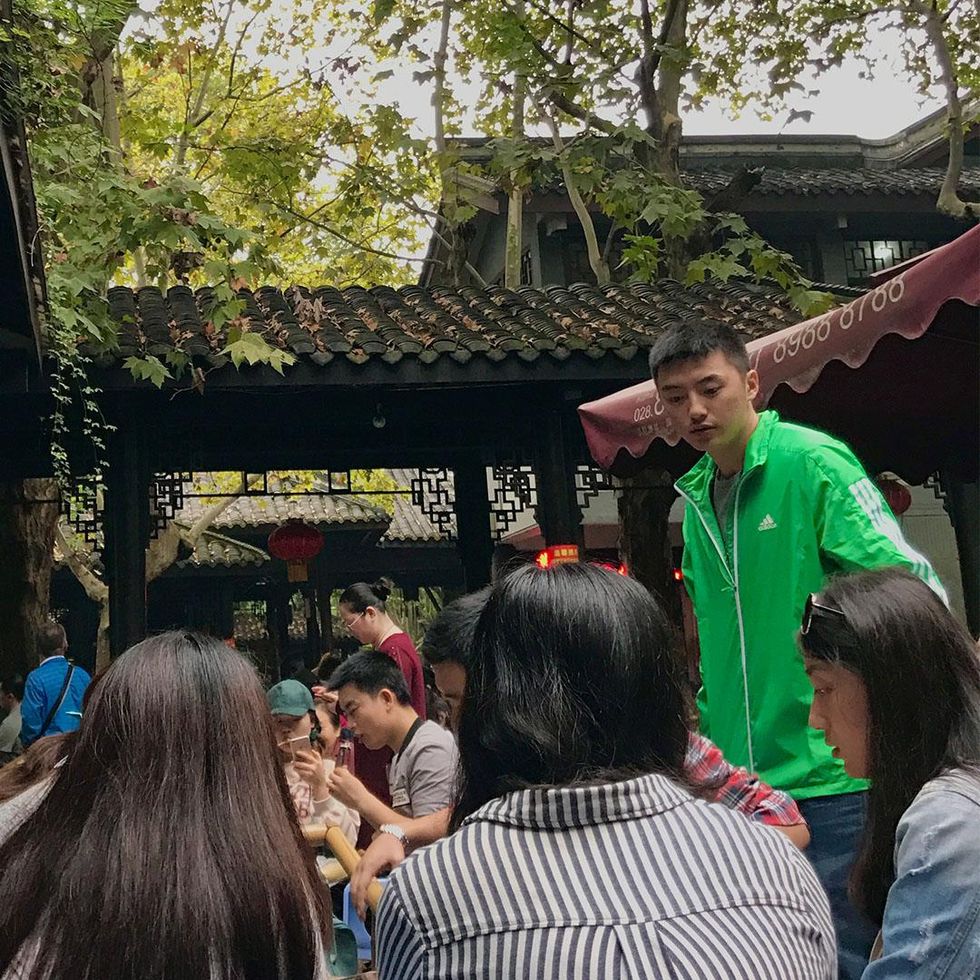Young Chinese say no matter how diligently they work, prospects for the average person seem bleak.
"My life is full of hope and despair at the same time. The future of the community is hopeful, but the future of myself is desperate."
Sam Cai works tirelessly for a Fortune Global 500 company in Shanghai, doing many additional hours on weekends. The unreasonable workload coupled with a disproportionately small salary have put him in a place where it feels as if, only one year after graduation, every drop of emotion has been squeezed from him. Sometimes, he just wants to quit and lie down.
Living in Shanghai, which has been called the New York of China, he and countless other young people, have no choice but to join the rat race. However, the ever-rising cost of living, especially housing, means their hopes of making a good life in the city are challenging.
Many new graduates who prefer to find their first job in one of China's four Tier One cities (Beijing, Shanghai, Guangzhou and Shenzhen) are finding they cannot afford a decent life there. The average monthly rent for a one-bedroom apartment in Shanghai is US$1094, according to Numbeo. That could be the entire basic monthly salary for a new graduate.
Cai is not alone, his is a generational experience. Facing increasingly fierce competition in society, a growing number of young Chinese, disillusioned by excessive work pressure with little to show for it, are choosing to "lie down and do nothing" to show their resistance to what they see as capitalistic exploitation. It's a phenomenon known as tang ping, which literally translates as lying flat.
'They do nothing to promote social welfare as a somebody. Then I can only preserve my own dignity as a nobody.'
The term tang ping first went viral on Chinese discussion board Tieba in April when Luo Huazhong, 31, a former factory worker in Sichuan, who quit his job to travel around the country, wrote a blog post titled "Lying Flat is Justice". It describes his travel experience after quitting work.
"I haven't worked for more than two years. I'm travelling all the time and don't think there is anything wrong," he said in the post. He also argued that his previous stress stemmed from peer pressure and stereotypes of what the older generation expected from him. After escaping from these invisible shackles, he said, he discovered the infinite possibilities of life, cycling to Tibet, picking up odd jobs along the way, even playing an extra (a corpse "lying flat") on a Chinese movie set.
The post resonated for many young Chinese and was widely shared and celebrated as an anti-consumerist declaration. However, that popularity led to notoriety and caught the attention of the censors. In addition to the deletion of the original blog, many posts endorsing it were taken down and a tang ping group with more than 9000 members on popular online forum Douban was removed from the platform.
The censors' crackdown suggests the ruling Communist Party sees the "lying flat" trend as a potential threat to social stability in China. President Xi Jinping declared, in his address to the party's centennial anniversary celebrations on July 1, that all Chinese need be "prepared to work harder than ever before to realise the goal of national revitalisation and the future belongs to the young people".
As authorities push back against any collective "lying flat and do nothing" approach, the trend has sparked a generational conversation about whether such behaviour is shameful or desirable.

Some state media outlets have labelled the trend shameful but in a recent online poll by The Cover News, more than 90 per cent of participants said a tang ping life was desirable. There was no breakdown of respondents by age, but young people are much more active on social media. The older generation is more likely to support the government's statement and to criticise this phenomenon based on their experience of growing up in a less affluent China and having had to work hard.
Challenging old ways
Li Hong is a successful female entrepreneur who started her own vocational education business in the early 1990s. It provides training for rural young people who have only completed nine years of compulsory education.
Asked about "lying flat" youth, she has a puzzled look on her face. "I can't understand their choices. Their parents provide them with such a carefree environment, which is impossible for my childhood. When I was young, every cell in my body was struggling."
Li had to fight hard to prove the worth of her educational training model, battling a prejudice against vocational education in Chinese society, to succeed. She looks at the new generation and thinks they lack responsibility towards family and society. "Their life is too easy and comfortable, which leads to weakness and depravity," Li said.
Li's daughter Zoe Xiao, a graduate anxious about upcoming campus recruitment this year, has a different view, arguing it is actually the parents who are responsible for the emergence of the lying-flat phenomenon. "It's because of the collective disappearance of their social responsibility," Xiao explained. "As the Confucian School suggests: 'When you are poor you can only help yourself, when you become rich you can help the whole world'. But they do nothing to promote social welfare as a somebody. Then I can only preserve my own dignity as a nobody."
The reason the older generation did not choose to lie down and do nothing in their youth, Xiao argued, is that if they had, they may have starved, due to the extreme poverty at the time. It is survival, rather than so-called hard work for the country's sake, that is the instinct that drives humans.
She said, given China's immense economic progress, the basic demand for survival has been outstripped by the desire to improve the quality of life.
As the country's development shifts to a new level, the principal contradiction challenging society has shifted. The new incongruity, according to Xinhua News, is "between unbalanced and inadequate development and the people's ever-growing needs for a better life".
For the younger generation, the cost of housing is rising faster than their incomes can afford. With mortgages that take a lifetime to repay and the cost of raising and educating children unaffordable due to expensive cram schools, many young people are resisting starting a family despite pressure from authorities to do so.
"Our growth is full of inspirational nonsense. The [way to success] of the older generation is no longer suitable for us. Since no matter how diligent we are, prospects seem bleak for average people," Xiao said.
A pandemic pause
These arguments no longer bother Christina Fu, 26, who practises the tang ping lifestyle. With the outbreak of COVID-19 in early 2020, she resigned her position with an Internet company in Beijing and returned to her hometown Zigong, a prefecture-level city in Sichuan province, south-western China. Her former employer was notorious for its 9-9-6 work culture (working from 9am until 9pm, six days a week). As a computer programmer, the overtime was especially severe. Fu said her career path and related major in university had all been decisions made by her parents. "Then, I was too young to figure out what I truly wanted and not confident enough to go against my parents' will," she sighed.
As the novelty of her high-pressure job in a Tier 1 city waned, Fu began to tire of the endless work hours and to worry about her hair falling out in reaction to getting too little sleep.

Initially, she started drinking to escape her reality but she recognised she was becoming dependent on alcohol. Although she stopped drinking, she then developed stomach trouble.
The last straw came when, despite coronavirus case numbers surging in Beijing, her company insisted on workplace attendance as per normal. Fu said she was totally frustrated with the inhumanity of her workplace and thanks to COVID-19, she was able to recognise this.
"Capitalists don't care whether workers live or die. They think there will be new employees when the old are gone. But the loss of business is unacceptable," she said.
After quitting her job, Fu left Beijing and used her savings to rent an apartment in her hometown, Zigong, where rental housing costs were more reasonable. By minimising her consumption, she can maintain her current situation without work for about two years.
"To be honest, I never felt so relaxed before. I've changed several harmful habits that consumed my health like my obsession with milk tea. Also, I have plenty of time to sit down or lie flat and contemplate, to explore my genuine interest, to expand the width of my short life," she said.
Of her long-term plans, she says to ask the question again next year. After all, her savings can support the lying-flat life for at least five more months.
At first, Fu's parents had strong objections to her decision to opt out. They thought she was just seized with an impulse at the very beginning, but after a long period of calmness, the positive changes in Fu shook their beliefs. Her father said "the judgement from neighbours didn't matter anymore when the eyes of their daughter shone with happiness".
Don't quit, mess around
Unlike Fu, many younger people do not have the courage to "lie down" completely. They chant slogans for self-hypnosis but still expect wealth and power. When Sam Cai is struggling through another weekend of overtime at his Fortune 500 company in Beijing, he chants the tang ping mantra to get him through the day. But he doesn't stop and lie flat.
He is more afraid that if he cannot keep up the relentless hours, the company will find someone to replace him who can. He is representative of a huge number of young people who see no choice other than to continue on but enact small acts of rebellion to stay sane.
Lily Zhuang is an activist and organiser of Young Entrepreneurs and Students Going Out, based in Guangzhou, a Tier 1 city in south-east China. She provides a fresh insight into how this group can take back some control, saying workers can mess around to oppose the exploitation implicitly without losing their jobs.
"Focus on improvements in efficiency, delay is useless for finishing work on time [and] work hard once aware of the presence of employers. For the rest of the time, you can mess around in the office quietly," she said.
So, what direction will China's younger generations choose? As Luo, the founder of the tang ping movement, said in his deleted manifesto: "I can sleep in my wooden barrel in the sun like Diogenes. I can also live in the cave and think about logos like Heraclitus. Lying flat is my Sophistic movement. Only when I have the right to lie down, is man the measure of all things."
Wen is studying a Master of Journalism and Communication at UNSW. She advocates body positivity and women's rights on the grounds of gender equality.






